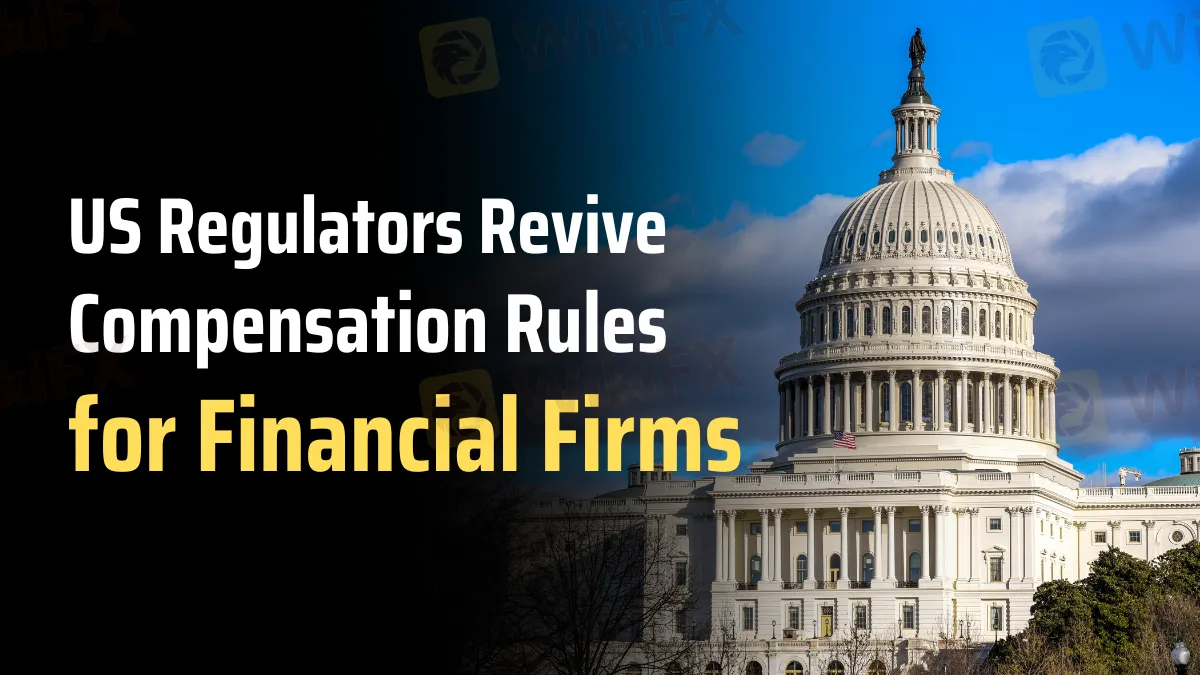简体中文
繁體中文
English
Pусский
日本語
ภาษาไทย
Tiếng Việt
Bahasa Indonesia
Español
हिन्दी
Filippiiniläinen
Français
Deutsch
Português
Türkçe
한국어
العربية
US Regulators Revive Compensation Rules for Financial Firms
Abstract:Federal agencies propose risk-sensitive executive pay plans to prevent excessive risk-taking.

Significantly, US bank authorities have rekindled attempts to put into effect long-delayed compensation regulations meant to increase the risk sensitivity of CEO pay schemes in financial companies. The regulation, proposed jointly by the Federal Deposit Insurance Corporation (FDIC), the Office of the Comptroller of the Currency (OCC), and the Federal Housing Finance Agency (FHFA), would outlaw incentive-based systems that do not consider risks or permit pay forfeitures and clawbacks. This repeated attempt is part of a larger effort to improve financial stability and stop CEOs of financial institutions from taking on too much risk. It follows a 2016 plan.
FDIC Chairman Martin Gruenberg emphasized the need to address unfair pay practices, particularly in large financial institutions. Such behaviors, he said, may have a huge influence on the whole financial system. The bankruptcy of Silicon Valley Bank the previous year brought to light the need for strong compensation regulations to reduce risk.
Industry players have criticized the plan, however. The new regulations would apply to banks with assets over $1 billion, with the harshest restrictions imposed on those with holdings exceeding $250 billion. Representing bigger banks, the Bank Policy Institute wrote down the proposal as “purely political.”
Because the FDIC, OCC, FHFA, National Credit Union Administration, Securities and Exchange Commission, and Federal Reserve all need to agree, putting these regulations into practice has been difficult. While the NCUA is anticipated to approve the idea shortly, the SEC has it on its calendar for rulemaking.
Jerome Powell, the Federal Reserve chairman, has not pledged to issue the rule this year. Powell wanted a strategy that effectively handled the risks involved with compensation and emphasized the need to understand the problem. The government delegate emphasized the need to consider existing industrial practices and reiterated the commitment to cooperate with other authorities.
Finalizing any new regulations requires public input. The agencies will keep getting comments on their websites as long as none of the regulators provide a coherent plan. The redoubled attention on compensation regulations highlights the continuous efforts to protect financial stability and encourage prudent risk management in the sector.

Disclaimer:
The views in this article only represent the author's personal views, and do not constitute investment advice on this platform. This platform does not guarantee the accuracy, completeness and timeliness of the information in the article, and will not be liable for any loss caused by the use of or reliance on the information in the article.
Read more

BlackRock Bitcoin ETF Outflows Hit $332M in Single Day
BlackRock’s IBIT sees record $332M outflows in a single day, setting a new milestone for Bitcoin ETFs. Discover market trends and what it means for investors.

Two Malaysians Sentenced for Running S$23M Pyramid Scheme in Singapore
Two Malaysian men have been sentenced in Singapore for orchestrating a S$23 million multi-level marketing (MLM) scheme that defrauded approximately 4,500 investors, including over 2,400 in Singapore.

Exnova Scam Alert: Account Blocked, Funds Stolen, and Zero Accountability
Exnova Forex scam exposed! Victim report blocked account and stolen funds from this unregulated broker. Learn how they operate and why you should stay far away.

Ghana Trader Jailed for $300K Forex and Crypto Scam
Trader Benjamin Boateng is in custody for a $300K fraud involving forex and crypto. Victims claim he promised big profits but lost their money.
WikiFX Broker
Latest News
Think Before You Click: Malaysian Loses RM240,000 to Investment Scam
Ghana Trader Jailed for $300K Forex and Crypto Scam
US Dollar Surge Dominates Forex Market
Hong Kong Police Bust Deepfake Crypto Scam Syndicate Involving $34 Million
What Are The Top 5 Cryptocurrency Predictions For 2025?
Lawsuit Filed Against PayPal Over Honey’s Affiliate Fraud
XRP Price Prediction for 2025: Will It Hit $4.30 or More?
Exnova Scam Alert: Account Blocked, Funds Stolen, and Zero Accountability
T3 Financial Crime Unit Freezes $100M in USDT
BlackRock Bitcoin ETF Outflows Hit $332M in Single Day
Currency Calculator







